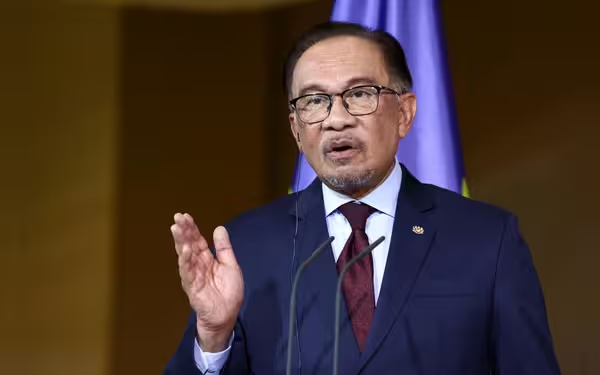Saturday, November 16, 2024 07:30 PM
Anwar Ibrahim's Historic Visit to Bangladesh for Trade and Labor Discussions
- Anwar's visit strengthens Malaysia-Bangladesh ties.
- Focus on trade, Rohingya crisis, and migrant workers.
- First foreign leader visit since Yunus took office.
 Image Credits: arabnewspk
Image Credits: arabnewspkMalaysian PM Anwar Ibrahim visits Bangladesh to discuss trade, migrant workers, and the Rohingya crisis with interim leader Muhammad Yunus.
Malaysian Prime Minister Anwar Ibrahim has made a significant visit to Bangladesh, arriving in the capital, Dhaka, to meet with interim leader Muhammad Yunus. This meeting comes in the wake of Yunus taking over leadership in August after the previous Prime Minister, Sheikh Hasina, fled the country during a mass uprising. Anwar's visit is not just a courtesy call; it is a crucial step in strengthening ties between Malaysia and Bangladesh, focusing on vital issues such as trade, investment, and the ongoing Rohingya refugee crisis.
Upon his arrival at Hazrat Shahjalal International Airport, Anwar was greeted with a grand reception, including gun salutes and a red carpet welcome. This visit marks a historic moment as it is the first time a foreign leader has visited Bangladesh since Yunus assumed office on August 8. Additionally, it is the first state visit by a Malaysian leader to Bangladesh in over a decade, highlighting the importance of this diplomatic engagement.
Leading a delegation of 58 members, Anwar's discussions with Yunus are expected to cover a range of topics. One of the primary focuses will be on enhancing trade relations. In 2023, Bangladesh emerged as Malaysia’s second-largest trading partner in South Asia, with total trade reaching an impressive $2.78 billion. This visit comes at a strategic time, as Malaysia is set to chair the Association for Southeast Asian Nations (ASEAN) next year, and Bangladesh is keen to boost its trade with this influential region.
Another critical issue on the agenda is the plight of the Rohingya refugees. Over one million Rohingya people from Myanmar currently reside in camps in Bangladesh, and the country is actively seeking ASEAN's involvement in addressing this humanitarian crisis. The collaboration between Malaysia and Bangladesh could play a pivotal role in finding solutions for these vulnerable communities.
Moreover, Malaysia is a significant destination for Bangladeshi migrant workers, with around 800,000 individuals employed in various sectors such as construction, manufacturing, and services. However, the recruitment process has faced criticism due to corruption and allegations of rights violations by both Malaysian employers and Bangladeshi recruiting agencies. Addressing these concerns will be essential for ensuring the welfare of Bangladeshi workers abroad.
In addition to trade and labor issues, the educational ties between the two nations are also noteworthy. Currently, more than 6,000 Bangladeshi students are pursuing higher education in Malaysia, reflecting the strong educational collaboration between the two countries.
Prime Minister Anwar Ibrahim's visit to Bangladesh is a significant step towards fostering stronger bilateral relations. As both nations navigate the complexities of trade, labor rights, and humanitarian issues, this meeting could pave the way for a more prosperous and cooperative future. The outcomes of these discussions will not only impact the two countries but could also resonate throughout the region, especially in addressing the pressing challenges faced by the Rohingya community. It is a moment of opportunity that both leaders must seize to create lasting change.













